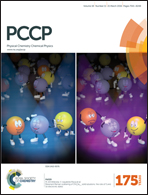Temperature effect on the build-up of exponentially growing polyelectrolyte multilayers. An exponential-to-linear transition point†
Abstract
In this study, the effect of temperature on the build-up of exponentially growing polyelectrolyte multilayer films was investigated. It aims at understanding the multilayer growth mechanism as crucially important for the fabrication of tailor-made multilayer films. Model poly(L-lysine)/hyaluronic acid (PLL/HA) multilayers were assembled in the temperature range of 25–85 °C by layer-by-layer deposition using a dipping method. The film growth switches from the exponential to the linear regime at the transition point as a result of limited polymer diffusion into the film. With the increase of the build-up temperature the film growth rate is enhanced in both regimes; the position of the transition point shifts to a higher number of deposition steps confirming the diffusion-mediated growth mechanism. Not only the faster polymer diffusion into the film but also more porous/permeable film structure are responsible for faster film growth at higher preparation temperature. The latter mechanism is assumed from analysis of the film growth rate upon switching of the preparation temperature during the film growth. Interestingly, the as-prepared films are equilibrated and remain intact (no swelling or shrinking) during temperature variation in the range of 25–45 °C. The average activation energy for complexation between PLL and HA in the multilayers calculated from the Arrhenius plot has been found to be about 0.3 kJ mol−1 for monomers of PLL. Finally, the following processes known to be dependent on temperature are discussed with respect to the multilayer growth: (i) polymer diffusion, (ii) polymer conformational changes, and (iii) inter-polymer interactions.


 Please wait while we load your content...
Please wait while we load your content...